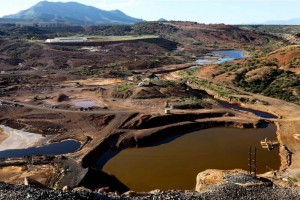Mining companies make a killing in Mexico

Research by UNIVERSAL revealed that between 2001 and 2014, mining rights ranged between 0.4% and 2% of the total value of mining production in Mexico. (Photo: ARCHIVE / EL UNIVERSAL )
Mining companies have made a killing in Mexico. However, in the
last 14 years they have paid a paltry amount to the government compared to the
huge profits obtained from extracting underground wealth.
Research by UNIVERSAL revealed that between 2001 and 2014, mining rights
ranged between 0.4% and 2% of the total value of mining production in Mexico.
In the first half of this year, the government received 978 million
pesos (73.8 million dollars) in mining rights, compared to the revenue of 95
billion pesos (7.1 billion dollars) obtained by mining companies in the same
period.
To calculate the figures EL UNIVERSAL used mining rights data provided
by the Ministry of Finance, while the mining production was obtained from the
National Institute of Statistics (INEGI).
If we add the income tax (ISR), the government's revenue amounted to 8%
of the total value of mining production from 2006 to this date.
The enormous profits obtained by mining companies, 287 of them foreign, can
not be compared with the rights and taxes they pay to the Mexican government.
For example in 2013 Grupo México, responsible of the worst environmental
disaster in modern mining history in the country, reported a net profit of 22.3
billion pesos (1.6 billion dollars), six times the revenue obtained by the
government for the rights paid by all mining companies.
The results are not surprising because until 2013, the Federal Rights
Law established that the holders of mining concessions should only pay between
six and 129 pesos every six months for each hectare under concession, depending
on their seniority.
The fee for the first and second year of operation is 5.91 pesos (40
cents of a dollar) per hectare; for the third and fourth year, 8.83 pesos (60
cents of a dollar); for the fifth and sixth year, 18.26 pesos (1.3 dollars); for
the seventh and eighth year, 36.73 pesos (2.7 dollars); for the ninth and
tenth year, 73.44 pesos (5.5 dollars), and from the eleventh year onwards,
129.24 pesos (9.7 dollars).
According to a study by Fundar Centro de Análisis e Investigación, the
lax tax system was established along with the 1992 Mining Law that sought to
deregulate the industry in order to promote investment and economic growth.
The law is so favorable to mining companies that they can keep the
concessions for 50 years, renewable for up to a century if they request it.
With the tax reform, which took effect in January this year, three new
royalty payments were added to increase the government's revenue from the mining
industry: an excise duty of 7.5% of the mining income; an extraordinary right
of 0.5% for companies that mine gold, silver and platinum (additional to the
excise duty), and a third payment that penalizes mining companies that remain
idle for two years. The effects of these reforms will start to be felt in the
first quarter of 2015.
However, some corporations are reluctant to pay the new taxes. In
February it was estimated that 30% of the mining companies would seek legal
protection (amparo) against the payment of special rights. Legal firms such as
Fasken Martineau are advising foreign mining companies for this purpose.
Even though failing to pay mining duties is punishable with the
cancellation of the concession, a report from the Superior Audit of the
Federation revealed that in 2012, 4,520 of the 26,495 owners failed to fulfill
this obligation.
However, the Ministry of Economy (SE) only penalized 2,102 concession
holders, i.e. 46.5% of the mining companies that failed to make the payments.
The report added that in 2012 the government failed to collect almost 100
million pesos (7.5 million dollars) for mining rights, i.e. 5% less than the
1.87 billion pesos (141.6 million dollars) that the government expected to
collect.
In states like Chiapas or Veracruz delinquency was so high that the
government could only collect 55% of what it expected. In Jalisco it failed to
receive a third of the projected mining rights and in Campeche it only obtained
72% of the expected revenue.
In 15 states mining revenue was higher than expected because concession
holders paid debts amounting to 29 million pesos (2.1 million dollars)
corresponding to previous fiscal years.





